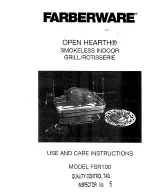
INSTALLATION
2-9
firing). Its contacts are rated for 120 VAC @ 5
amps. Refer to Figure 2.9 to locate the AUX
RELAY terminals for wiring connections.
2.9 FLUE GAS VENT INSTALLATION
The AERCO Venting and Combustion Air Guide,
GF-2050, must be consulted before any flue gas
vent or inlet air venting is designed or installed.
U/L listed, positive pressure, watertight vent
materials as specified in AERCO’s GF-2050,
must be used for safety and code compliance.
Because the unit is capable of discharging low
temperature exhaust gases, the flue must be
pitched back to the unit a minimum of 1/4" per
foot to avoid any condensate pooling and to
allow for proper drainage.
The combined pressure drop of vent and
combustion air systems must not exceed 140
equivalent feet of 8 inch ducting. Fittings as well
as pipe lengths must be calculated as part of the
equivalent length.
For a natural draft installation the draft must not
exceed -0.25”/+0.25" W.C. These factors must
be planned into the vent installation. If the
maximum allowable equivalent lengths of piping
are exceeded, the unit will not operate properly
or reliably.
2.10 COMBUSTION AIR
The AERCO Venting and Combustion Air Guide,
GF-2050, MUST be consulted
before
any flue or
combustion supply air venting is designed or
started. Combustion air supply is a direct
requirement of ANSI 223.1, NFPA-54, and local
codes. These codes should be consulted before
a permanent design is determined.
The combustion air must be free of chlorine,
halogenated hydrocarbons, or other chemicals
that can become hazardous when used in gas-
fired equipment. Common sources of these
compounds are swimming pools, degreasing
compounds, plastic processing and refrigerants.
Whenever the environment contains these types
of chemicals, combustion air must be supplied
from a clean area outdoors for the protection
and longevity of the equipment.
The Benchmark is UL listed for 100% sealed
combustion and can be ordered with a sealed
combustion option, or can be installed using
room air as long as there is an adequate supply.
(See paragraph 2.10.3 for more information
concerning sealed combustion air.)
If the sealed combustion air option is not being
used, an inlet screen will be attached at the
blower suction and the knockout at the top of the
unit will be and should remain in place.
The more common methods of supplying
combustion air are outlined below. For more
information concerning combustion air, consult
the AERCO GF-2050, Venting and Combustion
Air Guide.
2.10.1 COMBUSTION AIR FROM
OUTSIDE THE BUILDING
Air supplied from outside the building must be
provided through two permanent openings. Each
opening must have a free area of not less than
one square inch for each 4000 BTU boiler input.
The free area must take into account restrictions
such as louvers and bird screens.
2.10.2 COMBUSTION AIR FROM INSIDE
THE BUILDING
When combustion air is provided from within the
building, it must be supplied through two perma-
nent openings in an interior wall. Each opening
must have a free area of not less than one
square inch per 1000 BTUH of total boiler input.
The free area must take into account any
restrictions such as louvers.
2.10.3 SEALED COMBUSTION
The BENCHMARK boiler is UL listed for 100%-
sealed combustion and can be ordered with a
sealed combustion option or without. Units
ordered in the sealed combustion configuration
will come with an air inlet assembly installed on
the blower. The knockout at the top of the boiler
must be removed and the combustion air
ductwork must be attached to the 6" x 8" adapter
that is provided just below the knockout.
Remove and discard the screen attached to the
adapter.
In a sealed combustion air application, the
combustion air ducting pressure losses must be
taken into account when calculating the total
maximum allowable venting run. See the
AERCO Venting and Combustion Air Guide, GF-
2050. When using the boiler in a sealed
combustion air configuration, each unit must
have a minimum 8" diameter connection at the
unit.
Summary of Contents for AERCO Benchmark 2.0LN
Page 9: ... This page intentionally blank ...
Page 19: ... This page intentionally blank ...
Page 29: ... This page intentionally blank ...
Page 35: ... This page intentionally blank ...
Page 41: ...5 1 This page intentionally blank ...
Page 47: ...SAFETY DEVICE TESTING 6 1 This page intentionally blank ...
Page 70: ...APPENDIX C C 1 Temperature Sensor Resistance Chart Balco ...
Page 77: ...APPENDIX F F 2 ...
Page 78: ...APPENDIX F F 3 ...
Page 79: ...APPENDIX F F 4 ...
Page 92: ...APPENDIX G G 5 ...
















































